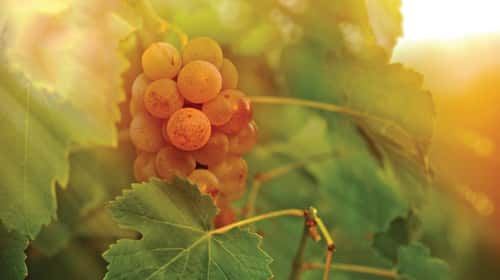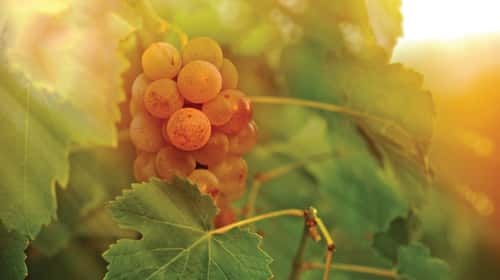 If you’ve ever dreamt of having your own winery, or you’re a winemaker without a winery, a custom crush might be the right facility to achieve your winemaking dreams. Starting out in the wine industry can be overwhelming for new winemakers and producers, especially given the cost of land, the process of building a winery, the complexity of permits, zoning, and other requirements and regulations. By making wine at a custom crush, winemakers and producers can put their resources into producing quality wine, rather than paying fees and worrying about permitting. Custom crushes provide the tools required to make world-class wine for small producers, including laboratories, tanks, barrel aging space, and bottling lines. In addition to supporting winemakers and producers, custom crushes also provide the consumer and corporations the opportunity to produce their own private label wine, with the assistance from skilled winemaking teams, who often use innovative technologies to create high quality wines.
If you’ve ever dreamt of having your own winery, or you’re a winemaker without a winery, a custom crush might be the right facility to achieve your winemaking dreams. Starting out in the wine industry can be overwhelming for new winemakers and producers, especially given the cost of land, the process of building a winery, the complexity of permits, zoning, and other requirements and regulations. By making wine at a custom crush, winemakers and producers can put their resources into producing quality wine, rather than paying fees and worrying about permitting. Custom crushes provide the tools required to make world-class wine for small producers, including laboratories, tanks, barrel aging space, and bottling lines. In addition to supporting winemakers and producers, custom crushes also provide the consumer and corporations the opportunity to produce their own private label wine, with the assistance from skilled winemaking teams, who often use innovative technologies to create high quality wines.
The demand for custom crush facilities has increased in the past 10 years, reflecting national trends in wine consumption and increased interest in the romance, exclusivity, and luxury living found in, and affiliated with, many wine regions, including Napa and Sonoma County.
Bottling and private labels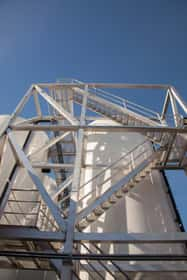
For many winemakers, the finances required to build, operate, and license a winery facility are prohibitive, which has led many to develop virtual brands, by creating small production, highly collectable, allotment only wines. The majority of these wines are produced at custom crush facilities that offer “berry to bottling” services, which include crushing, pressing, and juicing winegrapes, tank and barrel fermentation, lab services, and bottling. Custom crushes help new and experienced, small lot producers create a quality product with the support, and low overhead, they need.
Private label wine is also growing in demand. Grocery store private labels sales have doubled in growth over the past ten years and interest in consumers creating their own custom wine, for private consumption and gift giving, has also increased. Custom crushes provide corporate clients the opportunity to produce reasonably priced wines for retail sale, under the guise of customized labels such as Trader Joe’s Charles Shaw brand. They also empower individual consumers, who can work with a winemaker to create a wine that suits their tastes and impresses their friends with their custom blended and labeled wine.
The cost is a vital component as to what makes custom crushes so attractive. Average industry costs ranges from $1,800 a ton to $2,600 a ton, depending on the varietal and barrel program, for the entire package, and when others may charge a lower per-tonnage price, with add-on charges for bottling and other services.
Grapewagon Custom Crush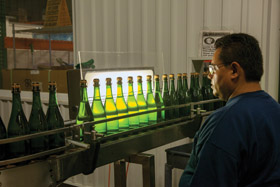
In the past 10 years, more than 30 custom crush facilities have opened in Sonoma and Napa Counties. As the demand for custom crushes continues to rise, long-time wineries are turning over their facilities, and offering their winemaking experience, to support other producers. Grapewagon Custom Crush, in Healdsburg, is one of those custom crushes.
In 2015, winemaker James MacPhail, and his wife, Kerry Forbes MacPhail, “flipped” their winery into a custom-crush facility. Originally built in 2008, the 42,000-square-foot winery served as the production facility for the couple’s acclaimed Pinot Noir-focused wine label, MacPhail Family Wines (MFW).
They sold MFW in 2011 to the Hess Collection, and MacPhail stayed on as winemaker. After the sale, they continued to use their winery to produce MFW wines, until the Hess Collection decided otherwise. “They pulled the brand out of the winery to produce elsewhere, so we flipped our winery in our backyard to a custom crush facility,” says MacPhail.
The couple oversees day-to-day crush operations with Colin MacLauchlan, who serves as director of custom crush operations. MacLauchlan served as cellarmaster at Littorai Wines in Sebastopol before joining Grapewagon, where he executes work orders placed by the individual winemakers Grapewagon works with at any given time. Currently, they work with eight winemakers, producing primarily Pinot Noir and Chardonnay for 12 labels, including Bacigalupi Vineyards, Sacramento-based Bailarín Cellars, and MacPhail and Forbes MacPhail’s own Tongue Dancer Wines.
“Grapewagon Custom Crush is full service,” says MacPhail. “We handle each client’s fruit the moment it’s delivered direct from the vineyard, all the way through bottling.” They focus on small-lot production wines and don’t have a tonnage requirement for the amount of grapes they work with, which is a boon for small producers who often run into challenges with larger facilities with tonnage requirements. Grapewagon’s largest client produces a mere 1,000 cases. In total, the facility is permitted to produce 5,000 cases of wine.
The facility itself is eco-friendly, with large windows providing natural light (a rare offering in a production facility), a roof that retracts heat and a constructed wetland to process wastewater, which also serves as an attractive environmental feature. The Grapewagon team has also created a welcoming space for brainstorming and collaboration, which they describe as a “wine think tank.”
“We have a very chill and relaxed winemaking environment, everyone enjoys being here,” MacPhail says. What’s more, the commute is short: “It’s in our backyard‑our house is 50 feet away, so we’re almost always here.”
Sugarloaf Crush
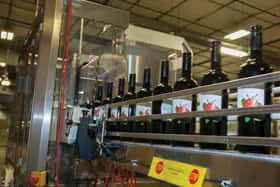 New, investor-backed facilities are also being built throughout Wine Country. Located in Kenwood at the base of Sugarloaf Mountain, Sugarloaf Crush opened its multi-million dollar facility just in time for the 2016 harvest. Sugarloaf Crush will total 52,000 square feet when the second phase of construction is completed in mid-2017, and has the capacity to produce 125,000 cases of wine.
New, investor-backed facilities are also being built throughout Wine Country. Located in Kenwood at the base of Sugarloaf Mountain, Sugarloaf Crush opened its multi-million dollar facility just in time for the 2016 harvest. Sugarloaf Crush will total 52,000 square feet when the second phase of construction is completed in mid-2017, and has the capacity to produce 125,000 cases of wine.
Ronald Du Preez, general manager and head winemaker, brings more than 15 years of winemaking experience to Sugarloaf. He manages the facility alongside General Manager Joe Reynoso, of Reynoso Family Vineyards. Francis Spangler serves as chief financial officer. She was vice president of finance at Time, Inc. for 13 years before joining Sugarloaf Crush.
Currently, the facility has six employees in production, including Du Preez and Mike Lucia, director of winemaking operations. Lucia was the winemaker at Healdsburg’s acclaimed Copain Wines for six years until joining Sugarloaf. Du Preez anticipates the property will have a staff of up to 22 year round and a total of 30 during harvest, all to manage an estimated 140 tanks.
“We’re very hands on,” says Du Preez, who served as associate winemaker at Jordan Vineyards & Winery and winemaker at M. Draxton Inc. before joining Sugarloaf Crush. “We focus on the higher-end scale of Sonoma County wine, especially Sonoma Coast vinos. We’re heavy on the Pinot Noirs. I would say about 40 percent of our clients are Pinot Noir.” Notable clients include Banshee Wines and Naked Wines.
Many of the clients that Sugarloaf Crush will serve for the 2017 crush are start-up wineries and small, virtual brands. The facility offers innovative production technologies including a Vaslin-Bucher Vistalys optical sorter machine, which uses cameras to scan and separate de-stemmed grapes, leaving only the best grapes behind for winemaking. At an average price tag of $100,000, the sorter is a special offering for small producers that may not have access to it without the support of a custom crush.
Sugarloaf Crush will also support small producers regarding front-of-the-house needs. When the second phase of construction is complete, the property will have a commercial kitchen and three private dining rooms. Sugarloaf Crush plans to let clients use these spaces for special wine tastings and events. Says Du Preez, “We want them to use our winery as if it’s their winery because a lot of virtual brands don’t have a winery they can call home. Our vision is to make Sugarloaf like a winery.”
In the past ten years, over 30 custom crush facilities have opened in Sonoma and Napa County, with two more slated to open this year. However, two facilities helped pave the way for the newer lot of custom crushes: Rack & Riddle and Bin to Bottle.
Rack & Riddle
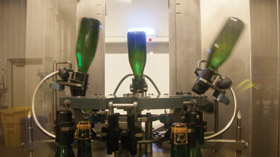 Based in Healdsburg, Rack & Riddle is one of the largest custom crush operators in the region, bottling more than one million cases annually for 150 clients throughout the country. They are one of the quickest growing custom crushes in Wine Country, having tapped from their inception into the sparkling wine market, which recently has seen renewed interest. This segment comprises a significant portion of their sales in the U.S. and is expected to grow by 10 percent in 2017.
Based in Healdsburg, Rack & Riddle is one of the largest custom crush operators in the region, bottling more than one million cases annually for 150 clients throughout the country. They are one of the quickest growing custom crushes in Wine Country, having tapped from their inception into the sparkling wine market, which recently has seen renewed interest. This segment comprises a significant portion of their sales in the U.S. and is expected to grow by 10 percent in 2017.
Rack & Riddle was founded in 2007 by two industry insiders: Rebecca Faust, former chief financial officer at Lambert Bridge Winery, and Bruce Lundquist, former partner at Longboard Vineyard and general manager at J Vineyards and Winery. Rack & Riddle has a staff of approximately 80, working in two facilities, located just minutes apart in Healdsburg and in the Geyserville area.
Recognized by California Certified Organic Farmers (CCOF), a Santa Cruz-based nonprofit that promotes organic certification and agriculture, Rack & Riddle’s winemaking program is overseen by Penelope Gadd-Coster, who served as sparkling winemaker at J Vineyards and Winery before joining Rack & Riddle in 2007. In late 2016, Gabriel Valenzuela, former winemaker at Langtry Estate, joined Rack & Riddle as senior winemaker. Agustin Ponce, director of operations, was promoted in 2016 from cellarmaster to his current position, in which he oversees all production facilities for quality, seamless operation.
In 2016, Rack & Riddle expanded their riddling capacity by 30 percent to 4,032 cases, after installing an innovative new riddling system built in the Champagne region of France. However, it’s not all about sparkling at Rack & Riddle; they also produce still wines for dozens of clients.
Approximately 70 percent of Rack & Riddle’s business comes from custom-crush and bottling clients, which include Breathless Wines and Amista Vineyards, two Healdsburg wineries lauded for their sparkling wine. Rack & Riddle also produces private label sparkling wines, which comprise the remaining 30 percent of their business. Their private label wines are primarily produced for wineries and corporations, rather than individual consumers, and have a 132-case minimum.
One of their most recent (and notable) custom projects includes a partnership with Major League Baseball to release a limited edition sparkling brut to celebrate the Chicago Cubs 2016 World Series Championship. It’s a fitting project, given that the Chicagoland region was the second highest consumer of sparkling wine in the country in 2016.
Bin to Bottle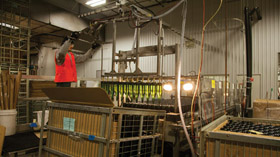
Napa Valley’s Bin to Bottle marked its 10th anniversary providing “high quality-high touch production methods” in 2016. Specializing in high-end, small-lot wine production, Bin to Bottle currently has two facilities in Napa and Rutherford. Serving approximately 60 clients annually, Bin to Bottle has a longtime, devoted staff, which has created a dedicated client base that includes many of Napa and Sonoma’s top brands.
Managing partner John Wilkinson oversees the business. Wilkinson’s experience in the luxury hotel industry has helped strengthen Bin to Bottle’s reputation for customer service, which is helped by low staff turnover and an attention to detail. Marco DiGuilio, one of Wilkinson’s partners and a well-known winemaker, has a long history in the industry, including serving as winemaker at Pepi Winery and the acclaimed Lokyoa brand. They oversee a staff of 45 at Bin to Bottle, which grows to 90 during harvest.
A self-proclaimed “red wine house,” long-time winemaker Toshi Wakayama is the director of winemaking. Bin to Bottle prides itself on being early adopters of new technology, reinvesting profits directly into cutting edge, custom crush equipment, including the Blue Morph system, which uses light to sanitize tanks and equipment.
After Bin to Bottle’s first crush in 2006, demand doubled in 2007 and then doubled again in the following couple years. Since then, interest in making wine hasn’t slowed at Bin to Bottle. They’re expanding their production starting in mid-2017, with construction on a new facility (adjacent to their existing Napa winery) to be finished in early 2018. This will add an additional 50,000 square feet of space, enabling them to produce 250,000 more gallons in addition to their current 320,000 gallons.
The future of custom crush
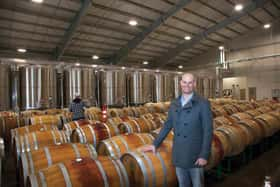 As demand for private label wines grows in the corporate world and the Wine Country lifestyle attracts fledgling winemakers and investors who fantasize of having their own wine brand, custom crushes will continue to evolve. They’ll evolve beyond the bottle, chasing the trend of canned wine, which grew 125.2 percent in 2016, according to the Nielsen Company, a global marketing research firm based in New York City. Canned wine is ecofriendly, generally inexpensive, and has the quirkiness to appeal to the growing Millennial wine consumer market. They’ll also provide clients additional facilities, beyond wine production, including onsite tasting rooms, providing brands the opportunity to share their product with the public through appointment only and special event tastings. Facilities are also expected to move towards sustainable and organic practices, including Leadership in Energy & Environmental Design certified facilities. Popularly known as LEED, the nonprofit operates the world’s leading green building certification program.
As demand for private label wines grows in the corporate world and the Wine Country lifestyle attracts fledgling winemakers and investors who fantasize of having their own wine brand, custom crushes will continue to evolve. They’ll evolve beyond the bottle, chasing the trend of canned wine, which grew 125.2 percent in 2016, according to the Nielsen Company, a global marketing research firm based in New York City. Canned wine is ecofriendly, generally inexpensive, and has the quirkiness to appeal to the growing Millennial wine consumer market. They’ll also provide clients additional facilities, beyond wine production, including onsite tasting rooms, providing brands the opportunity to share their product with the public through appointment only and special event tastings. Facilities are also expected to move towards sustainable and organic practices, including Leadership in Energy & Environmental Design certified facilities. Popularly known as LEED, the nonprofit operates the world’s leading green building certification program.
The wine industry is notoriously hard to break into, but custom crushes make it possible by addressing cost and accessibility issues. What’s more, they’ve created cooperative, environments that focus on supporting one another to produce the best wine, at the best price, with the best tools. Custom crushes have helped empower consumers by helping the everyday wine drinker with a little financial investment and a good nose live the winemaking dream.


